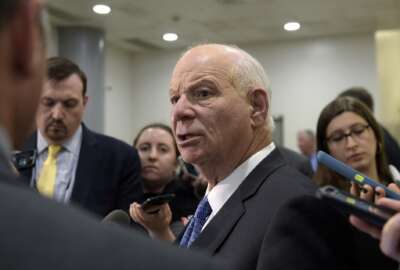
Senate bills would secure back pay for low-wage federal contractors
A bill in Congress would make sure federal employees who work in security, food service, and janitorial services, get reimbursed after the government shutdown ends.
To listen to the Federal Newscast on your phone or mobile device, subscribe on PodcastOne or Apple Podcasts. The best listening experience on desktop can be found using Chrome, Firefox or Safari.
- Several senators are currently working on new legislation to give back pay to low-wage federal contractors during the partial government shutdown. The bill would guarantee contractors working as agency cafeteria workers, security guards, janitors and others would be paid retroactively once the shutdown ends. Sens. Tina Smith (D-Minn.) Mark Warner (D-Va.) Tim Kaine, (D-Va.) Chris Van Hollen (D-Md.) Ben Cardin (D-Md.) and Sherrod Brown (D-Ohio) introduced the bill. Federal contractors haven’t typically gotten back pay after a government shutdown. (Sen. Tina Smith)
- Agencies will have to hold off on giving their political appointees pay raises. They were set to kick in over the weekend. But new guidance from the Office of Personnel Management acknowledges Congress could eventually reverse course and decide to freeze pay for political appointees in an appropriations bill or continuing resolution. OPM said it will issue new guidance once the funding situation becomes more clear. (Federal News Network)
- News that political appointees were even going to get raises is not faring well with federal employee groups. The National Treasury Employees Union expressed outrage over the president’s year-end executive order implements 2019 pay raises for political appointees, but not career federal employees. Congress has chosen to freeze pay for political appointees through a provision in omnibus spending packages for the past four years. But lawmakers left some appropriations bills unfinished. And that’s triggered automatic pay adjustments for employees on the Executive Schedule. (Federal News Network)
- The Census Bureau’s 2020 count operations have kept running during the partial shutdown. But the agency sees its resources dwindling as the shutdown enters its third week. The Census Project, a coalition of good-government organizations, estimates the agency can fund decennial count work for a shutdown lasting up to six-to-eight weeks. The agency has used carryover funding from fiscal 2018 to keep operating. (Federal News Network)
- Two senators introduced bipartisan legislation to establish a new federal office focused on combating Chinese and other foreign threats to U.S. technology. Sens. Mark Warner’s (D-Va.) and Marco Rubio’s (R-Fla.) idea is to create the Office of Critical Technology and Security at the White House to help coordinate efforts to protect technology across the federal government. Warner said there is a need for a whole-of-government technology strategy to protect U.S. competitiveness in emerging and dual-use technologies and address the Chinese threat by combating technology transfer from the U.S. (Sen. Marco Rubio)
- The House is set to vote on several bills this week to improve the federal acquisition process for small businesses. House leadership said seven bills will come to the floor. Among them is legislation to require the Small Business Administration to report to Congress on the number of contracts receiving the “best in class” designation and how many task orders went to small firms. Another bill would expand the number of sole source contracts available for HUBZone, service-disabled veteran owned and women-owned small companies. (House.gov)
- Kelly Olson, acting director of the General Services Administration’s Technology Transformation Service is leaving for a job in the private sector. GSA confirms to Federal News Network that Jan.18 will be her last day. Former SunTrust Bank executive and chief information officer Anil Cheriyan will take over as the permanent head of TTS later this month. Olson served as TTS chief of staff before heading up the agency in August.
- A second key GSA technology executive is jumping to the private sector. Justin Herman is leaving the General Services Administration to join Twilio as its first head of public sector. Herman spent the last six years directing the Emerging Citizen Technology program office for GSA’s Technology Transformation Service. During his time at GSA, Herman led the effort to educate and implement emerging technologies like artificial intelligence, robotics process automation and many others. At Twilio, Herman will help the communications platform provider break into the federal, state and local markets.
- The Senate confirmed Ellen McCarthy as assistant secretary of state for intelligence and research. McCarthy is the former chief operating officer of the National Geospatial-Intelligence Agency. McCarthy spent the last two years as vice president of intelligence and analytics at Noblis, a nonprofit science and technology organization. (Congress.gov)
- The Air Force Officer Training School is pivoting away from separate programs for line and non-line officers. Line officers usually fill operational billets, while non-line officers take staff positions. The Air Force said the two separate training programs will be phased out over 2019 and replaced with a combined eight-week course. The course will provide an offramp for nonline specialties. The Air Force said the change will increase the quality and quantity of officers. (Air Force)
- The U.S. Military Academy is beginning a major IT overhaul, starting by moving itself away from military networks. West Point IT officials said the changes are based on the idea that the academy has more in common with other universities than it does with military organizations. So starting this month, it said it’s breaking free of the .mil top-level-domain and moving its users to a cloud-based .edu infrastructure. Part of the project will serve as a pathfinder that might eventually show the Army how to move its email services to a commercially-run cloud environment. (Department of Defense)
Copyright © 2025 Federal News Network. All rights reserved. This website is not intended for users located within the European Economic Area.
Eric White
Eric White is news anchor and Federal Drive producer at Federal News Network.
Follow @FEDERALNEWSCAST
Related Stories

Now in a new Congress, lawmakers reintroduce back pay legislation for feds during shutdown
Related Topics
2020 Census
Acquisition
Air Force
All News
Army
China
Congress
Contracting
Cybersecurity
Defense
Defense News
Democrats
Ellen McCarthy
Federal Drive
General Services Administration
IT Modernization
National Treasury Employees Union
Office of Personnel Management
Senate
Small Business Administration
Technology
Unions
Workforce




